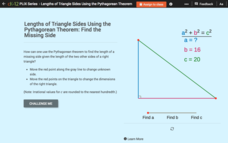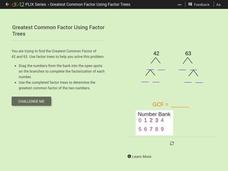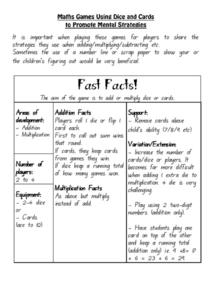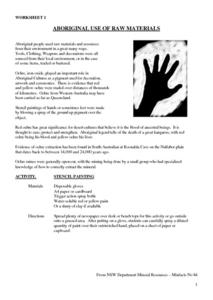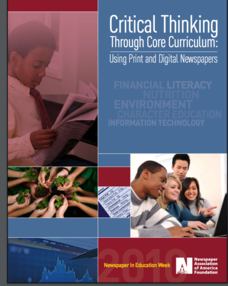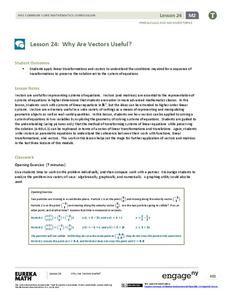CK-12 Foundation
Lengths of Triangle Sides Using the Pythagorean Theorem: Find the Missing Side
What is the relationship between the sides of a right triangle? Learners use an interactive to create models of right triangles and view the relationship between the lengths of the sides. They finish by using the Pythagorean Theorem to...
CK-12 Foundation
Greatest Common Factor Using Factor Trees
Beginning with a description that sets the stage, learners are asked to break down the numbers 42 and 63 to find the greatest common denominator using factor trees. As they work through the factoring process, young mathematicians are...
CK-12 Foundation
Intercepts by Substitution: Finding a Linear Product Using a Quadratic
Discover another way to interpret multiplication. Using an interactive, learners slide points (representing the factors of multiplication) along the x-axis of the graph of y = x^2 and observe changes in the line segment connecting the...
CK-12 Foundation
Graphs Using Slope-Intercept Form: Zip-Line
Zip lines aren't so scary when all your scholars use them for is math. Young mathematicians see how the slope of a zip-line to a building changes as the height changes. They answer a set of challenge questions regarding the scenario.
Big Kid Science
Measuring Shadows Using an Ancient Method
How did ancient peoples determine the height of really tall objects? Young scientists and mathematicians explore the concept of using shadows to measure height in a hands-on experiment. Paired pupils measure shadows, then calculate the...
CK-12 Foundation
Proportions Using Cross-Multiplication: Proportions Using Cross Product
Don't get it crossed—the resource is a great one. Scholars read and watch a video that explains proportions and cross products. They then use an interactive to determine that cross products are equal and answer a set of challenge...
Scholastic
Defining Conflict Using "The Interlopers"
Feeling conflicted? Work out those issues with a language arts lesson on internal and external conflict. Using "The Interlopers" by Saki, class members identify the conflicts between the characters before writing their own short...
Pedago Net
Math Games Using Dice and Cards to Promote Mental Strategies
Develop mental math skills using these fun partner games. Covering basic operations, each one offers differentiation options, extension ideas, and clear directions. Dice or cards is all you'll need to keep kids' attention as they...
NSW Department Mineral Resources
Aboriginal Use of Raw Materials
What's the difference between base metals and precious metals? Experimenting with natural metals is an interesting way for kids to learn about the world around them. Use a resource that contains over 30 pages of worksheets and...
Newspaper Association of America
Critical Thinking through Core Curriculum: Using Print and Digital Newspapers
What is and what will be the role of newspapers in the future? Keeping this essential question in mind, class members use print, electronic, and/or web editions of newspapers, to investigate topics that include financial...
EngageNY
Ferris Wheels—Using Trigonometric Functions to Model Cyclical Behavior
Have class members going in circles as they model the path of a Ferris Wheel using trigonometric functions. Building on the previous lesson in this series on transformations, learners use trigonometric functions to model wheels of...
EngageNY
Using Permutations and Combinations to Compute Probabilities
Now that we know about permutations and combinations, we can finally solve probability problems. The fourth installment of a 21-part module has future mathematicians analyzing word problems to determine whether permutations or...
EngageNY
Why Are Vectors Useful? 2
Investigate the application of vector transformations applied to linear systems. Individuals use vectors to transform a linear system translating the solution to the origin. They apply their understanding of vectors, matrices,...
Curated OER
The Use of Language in "I Know Why the Caged Bird Sings"
Readers of I Know Why the Caged Bird Sings are asked to craft an essay in which they compare how Maya Angelou uses figurative language to depict herself and Mrs. Flowers.
EngageNY
Using Tree Diagrams to Represent a Sample Space and to Calculate Probabilities
Cultivate the tree of knowledge using diagrams with two stages. Pupils create small tree diagrams to determine the sample space in compound probability problems. The lesson uses only two decision points to introduce tree diagrams.
EngageNY
Using Sample Data to Compare the Means of Two or More Populations II
The 23rd segment in a series of 25 presents random samples from two populations to determine whether there is a difference. Groups determine whether they believe there is a difference between the two populations and later use an...
EngageNY
Dividing Multi-Digit Numbers Using the Algorithm
Scholars learn to divide multi-digit numbers using the standard algorithm in the 14th installment in a module of 21 parts. They get plenty of practice with the algorithm by completing a worksheet.
Learning Games Lab
How to Use Oil Immersion Microscope
Teach the class how to use a microscope to identify bacteria in food. Scholars explore the different parts of the microscope and learn how to determine total magnification. They walk step-by-step through the procedure of preparing slides...
Statistics Education Web
Using Dice to Introduce Sampling Distributions
Investigate the meaning of a sample proportion using this hands-on activity. Scholars collect data and realize that the larger the sample size the more closely the data resembles a normal distribution. They compare the sample proportion...
Khan Academy
Practice: Using While Loops
Test your knowledge of loops with this short online quiz about using the while statement in JavaScript code. Get five questions correct in a row and you're done!
Wordpress
Greetings - How and Where Might We Greet Someone Using Spanish?
Use the Total Physical Response (TPR) strategy to practice Spanish greetings as well as where and who question prompts. Comprised of five days, this short unit is taught completely in Spanish with call-and-response exercises,...
Curated OER
Using Commas with Adjectives
Practice using commas with adjectives with a worksheet highlighting coordinate and cumulative adjectives. After reviewing definitions and examples, learners show what they know by correctly punctuating 10 sentences with adjectives....
West Contra Costa Unified School District
Using Bar Models to Solve Rate Problems
Pupils visualize distance-rate-time problems by using bar models. The lesson presents examples of four different types of rate problems and shows how they can be solved using bar models and equations. Each example is followed...
EngageNY
Describing Variability Using the Interquartile Range (IQR)
The 13th activity in a unit of 22 introduces the concept of the interquartile range (IQR). Class members learn to determine the interquartile range, interpret within the context of the data, and finish by finding the IQR using an...
Other popular searches
- Addition Using Manipulatives
- Creating Art Using Music
- Chemical Change Using Apples
- Lessons Using Apples
- Multiplying Using Arrays
- Math Using Arctic Animals
- Addition Using Grouping
- Addition Using Unifix Cubes
- Adding Decimals Using Money
- Cultural Studies Using Math
- Add Fractions Using Pictures
- Addition Using Manipulative's
